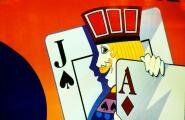Featured Casino
Sun Palace Casino


Blackjack Strategies
Visit Las Vegas USA Casino

Play Online Blackjack, Poker, Slots and many other online casino games!
Blackjack Articles
Featured Casinos
Vegas Casino Online
Sun Palace Casino
Slots Plus .com
Search articles online
General Gambling Articles
Best BlackJack Game
How Big To Bet
D'Alembert System
Summary on D'Alembert System

Play Blackjack,
Free Card Games
and more at
Vegas Online Casino
How Big To Bet
D'Alembert System
Summary on D'Alembert System

Play Blackjack,
Free Card Games
and more at
Vegas Online Casino
Gambling Links
Avoiding Good Blackjack Plays II |
<< Back | ||||||
When playing blackjack, the only other way I sometimes deviate from proper play of the hands is something I have found valuable for camouflage: buying insurance on the first round after a shuffle if I have a small bet out.
Pit bosses seem to relax when I buy insurance, if they are certain I have made a bad play. The reason this ploy is effective only on the first round is that, unless the boss is counting cards or checks the discards, the first round after a shuffle is the only time she can be certain insurance is a bad play.
(At single deck right after a shuffle, if you can see the cards in two or more hands and you see no 10s, insurance is a good bet.) More than once a pit boss has seen me buy insurance (or accept even money on a natural, which is the same thing), glanced down at the discards, seen it is the first round after a shuffle, and walked away smiling.
Don Schlesinger adds: I think you may be missing a rather important point regarding blackjack dealers who call out "surrender", "doubling down on soft eighteen", "hitting soft eighteen", and the like. I do not at all agree that their primary purpose in doing this is to finger good blackjack players, or counters. I am friendly with several dealers. I know a great deal about dealing procedures and regulations. I have been told that dealers are told to call out "unusual" plays primarily so that there can be no argument later if a player claims he never intended to make the play. If a person wishes to hit an ace-7, the attitude is, "If he is stupid enough to do it, let him; but call it to our attention so that there will be no mistake about what he is doing." As for surrender, you have to understand that to the camera up above, there had better be a good reason why, with no hand signal whatsoever from the player, the dealer suddenly reaches over and scoops up half his bet. They must call out "surrender" to authorize the touching of the money. My god, with the way idiots surrender in this game, does anyone really think the dealers call out "surrender" to finger the good blackjack players?! NEVER! It is strange, but perhaps just as all the above has never occurred to you as the reason for calling out these plays, I assure you that when they have happened to me, I have never for a moment felt the least bit threatened. The casinos' motives, believe it or not, may be purer than one might imagine. I agree, except when a dealer calls out, "Doubling down on soft eighteen like he knows what he is doing." The important thing, when a dealer calls out your play, is to just sit there calmly. If you flinch when the dealer calls out "Doubling on soft eighteen" or "Surrender," you are calling attention to yourself. I often wonder why American casinos do not adopt a hand signal for surrender in blackjack to pacify the eye in the sky. There is a hand signal for surrender in Asian casinos: One draws an imaginary line behind the hand, as if to cut it off. The motion resembles the gesture used to indicate suicide by "slitting one's throat."
© Copyright 2006 Online Blackjack News. It may not be published, broadcasted, rewritten, or redistributed.
|
|||||||






 Trackback URL |
Trackback URL |
 0 Comments
0 Comments